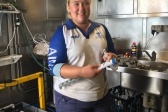

Josephine Nielsen
jv.nielsen@aims.gov.au
PhD
College of Public Health, Medical & Veterinary Sciences

Josephine Nielsen
jv.nielsen@aims.gov.au
PhD
College of Public Health, Medical & Veterinary Sciences
Natural variation in heat tolerance, thermal plasticity and performance trade-offs of corals on the Great Barrier Reef
Josephine is an eco-physiologist working primarily on the effects of heat stress on coral holobiont physiology within the Reef Restoration and Adaptation Programme (RRAP) at the Australian Institute of Marine Science (AIMS) with the Enhanced Corals and Treatments team. Her work spans several research projects from investigating the effects of long-term thermal acclimation on heat tolerance, documenting symbiont communities of heat-tolerant corals, and building on her PhD experience through advancing the application of rapid heat stress assays to coral tolerance assessments. Originally from Denmark, Josephine moved to Townsville in July 2013 to pursue a Bachelor of Science, majoring in marine biology, and proceeded to fall in love with the area.
Natural variation in heat tolerance, thermal plasticity and performance trade-offs of corals on the Great Barrier Reef
2019 to 2023
Project Description
The project investigated natural variation and plasticity in coral thermal tolerance and associated trade-offs. Variation in thermal performance were estimated with an instant heat stress assay in the field while thermal plasticity and physiological trade-offs were estimated from thermal performance curves of corals exposed to a range of temperatures in the laboratory.
The overall project objective is to examine the relationship between coral genotypes, phenotypes and their thermal environments to increase our understanding of thermal adaptation, variability in thermal tolerance, and identify physiological trade-offs associated with increased thermal tolerance.
The specific aims of the project are:
Aim 1 - Assess growth and survival of two coral species across multiple temperatures.
Aim 2 - Construct thermal performance curves and identify physiological trade-offs associated with increased thermal tolerance.
Aim 3 – Assess patterns of natural variation and phenotypic plasticity in thermal tolerance between species, populations and latitudes by quantifying upper heat tolerance across the GBR and identify coral populations ideal for selective breeding initiatives by correlating patterns of thermal tolerance to environmental parameters.
Aim 4 – Compare upper thermal tolerance results from classic, long-term temperature exposure experiments with acute heat stress experiments.
Aim 5 – Evaluate genetic mechanisms underlying thermal tolerance by correlating pre-stress gene expression to heat-stress and recovery phenotypes to identify gene expression signatures of tolerance.
Project Importance
Understanding natural variation and trade-offs associated with enhanced thermal tolerance is important for proposed management interventions such as Assisted Gene Flow. This knowledge is currently limited, but essential to understand corals’ ability for adaptation and to identify source populations or individuals with high thermal tolerance.
Project Methods
Aims 1 & 2: This study exposed corals to a wide range of temperature treatments in aquarium-based experiments conducted in the National SeaSimulator Facility (AIMS)
Aim 3: This study undertook field-based acute heat stress assays on two species of corals (Acropora tenuis and Pocillopora verrucosa) from 20 reefs using a mobile temperature manipulation tank system
Aim 4: This study compared physiological responses to long-term and acute temperature treatments. Immediately following collection of corals for aims 1 and 2, an acute heat stress trial was conducted whilst in the field, onboard the research vessel.
Aim 5: RNA was extracted from 45 samples of one A. tenuis population selected for a wide range of phenotypes. Differential gene expression analysis was performed.
Project Results
Josephine has undertaken initial trials with the field-deployed acute heat stress system, testing the system and practicality in the field and the underlying method/principle under aquarium conditions at the SeaSim.
In the field, she conducted a couple of proof-of-concept studies examining the effect of coral fragment size and the effect of sampling time point post heat stress on the thermal physiological responses of two species; Acropora tenuis and Pocillopora damicornis. While sample processing and data analysis is still ongoing, she found that Symbiodiniaceae cell density changed markedly with regards to post-heat sampling time point. The difference between the control corals (ambient temperature) and the high-treatment corals (35.3oC) became pronounced 9h after the end of heat exposure. This pattern is also reflected in chlorophyll content. Preliminary investigation of photosynthesis efficiency data however, does not show a similar pattern across the first 4 time point
Josephine also completed a similar experiment conducted in the National Sea Simulator, aiming to validate the acute heat stress principles. She monitored coral growth over time (5 weeks) in response to four heat treatments (30, 32, 34, and 35.5oC) with short-term durations (6h). A. tenuis fragments were weighed prior to the 6h heat treatment and again 10 days and 5 weeks post treatment. Interestingly, both the 30oC and 32oC treatments resulted in increased weight gain detectable 10 days after heat exposure relative to ambient-treated corals whereas corals exposed to 34oC over just 6h recorded growth reductions.